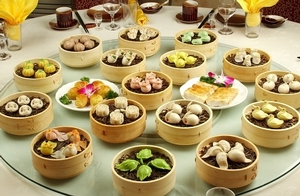Wontons are eating on the night of the Chinese New Year, or Spring Festival. The New Year gets the name Spring Festival from its proximity to the beginning of spring (Newman, 156). Beyond wontons, symbolic Chinese New Year foods include whole fish, spring rolls, jiaozi, and niangao (New Year’s cake) (Newman, 159). In addition, families traditionally give gifts of food with special meaning, for example, oranges for good fortune, peaches for long life, and apples for peace (Newman, 160).
In Chinese Food, Liu Junru calls wrapping and eating dumplings on Spring Festival “an indispensable feast activity for every family” (Junru, 46). After the women of the household prepare the wonton feast, people anxiously wait until the clock strikes midnight, making the wontons the first meal of the year to bring good luck and prosperity. All wontons are prepared in advance, however, for the Chinese believe the usage of sharp knives on the eve and day of Spring Festival will cut their luck in the coming year (Newman, 159). On this special occasion, only immediate family members gather for the dumpling celebration; rarely does the event include friends or extended family (Newman, 153). Interestingly, the first meal of the year is not dumplings for those in Southern China, nor for China’s minority nationalities. The festive atmosphere of the Chinese New Year lasts fifteen days into the first month, when the Lantern Festival marks the first full moon of the year (Junru, 47).


